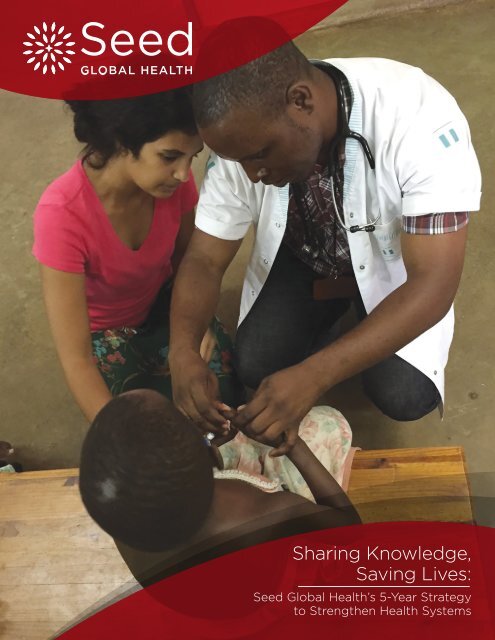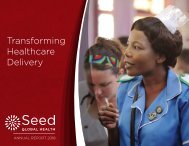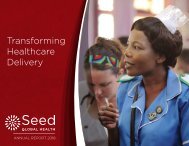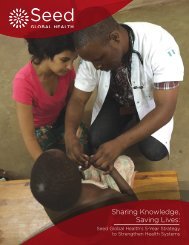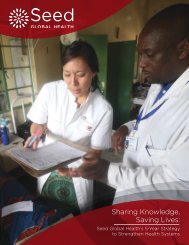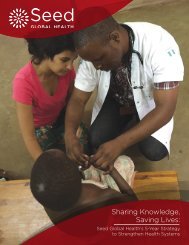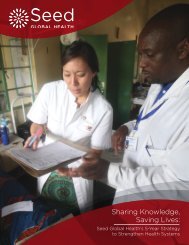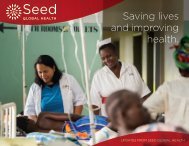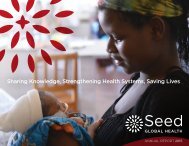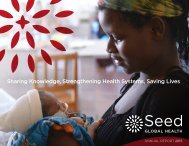Strategy Long
You also want an ePaper? Increase the reach of your titles
YUMPU automatically turns print PDFs into web optimized ePapers that Google loves.
Sharing Knowledge,<br />
Saving Lives:<br />
Seed Global Health’s 5-Year <strong>Strategy</strong><br />
to Strengthen Health Systems
Founded in 2012, Seed Global Health has<br />
forged meaningful and trusted partnerships,<br />
and demonstrated<br />
PREFACE<br />
significant impact in<br />
strengthening health systems through human<br />
resource Founded for health in 2012, capacity. Seed Global With Health unique (Seed) has built a strong reputation, forged meaningful<br />
focus and on education trusted partnerships, and care, and Seed demonstrated Global significant impact in strengthening health systems<br />
Health through (Seed) building has already human helped resource train for health more capacity. With a unique focus on educating and<br />
than 13,700 training health skilled health professionals professionals in close in Africa, Seed helped mobilize 191 physicians, nurses, and<br />
partnership midwives with to serve local, as in-country year-long educators colleagues. at 27 training institutions across five countries in<br />
Seed believes<br />
partnership<br />
that<br />
with<br />
the<br />
the<br />
heart<br />
US government<br />
of rectifying<br />
and others. These educators represented 23 medical and<br />
the myriad health challenges facing Africa -<br />
nursing specialties, helped train over 16,000 health professionals, and taught over 850 courses<br />
including crushing burdens of disease, poor<br />
and new skills in close partnership with local counterparts and colleagues.<br />
infrastructure, and<br />
lack of<br />
Through<br />
access<br />
a<br />
to<br />
methodical<br />
quality care<br />
and<br />
–<br />
long-term<br />
is educating<br />
partnership approach with local training institutions<br />
and training more,<br />
and governments, Seed has had an impact beyond the individual education and training of<br />
skilled health professionals<br />
health professionals. Seed helped the newest nursing school in Northern Uganda enroll its first<br />
to help provide quality care, train future<br />
providers<br />
students<br />
and<br />
by<br />
support<br />
supporting<br />
existing<br />
the school’s accreditation process and curriculum development; these<br />
ones, students and to strengthen are now graduating health systems. and teaching in the region. Seed introduced a new advanced<br />
practice nursing position in Malawi to provide clinical supervision and quality improvement<br />
Seed’s initiatives strategic in plan the hospital - Sharing setting. Knowledge, In the Kingdom of Eswatini(formerly known as Swaziland)<br />
Saving Seed Lives: worked Seed with Global the Ministry Health’s of Health, the Nursing Council, the nursing institutions, and<br />
<strong>Strategy</strong> for Improved and Sustainable<br />
the hospitals to develop an entry-to-practice nursing exam and a<br />
new<br />
Healthcare<br />
advanced practice nursing role that will advance primary care<br />
Delivery 2019-<br />
throughout the country.<br />
2023 -<br />
articulates Seed’s work our is both unique and essential in solving the health,<br />
economic, multi-layered political, social, and gender disparities the world faces<br />
today.<br />
approach<br />
There still remains immense challenges for health systems<br />
to address these<br />
in Africa, including crushing burdens of infectious and preventable<br />
disease, a rising burden of non-communicable disease,<br />
poor infrastructure, disease outbreaks, and lack of access<br />
to quality care. At the heart of these challenges, there are<br />
simply not enough health professionals to provide quality<br />
care to patients, train future generations of health care<br />
providers or to help solve the underlying problems that<br />
continually distress health systems.<br />
Seed’s strategy - Sharing Knowledge, Saving Lives:<br />
Seed Global Health’s 5-Year <strong>Strategy</strong> to Strengthen<br />
challenges: Health measurably<br />
Systems - was developed with broad involvement from stakeholders, peers, current<br />
improving partners, the Seed’s training staff, of and local future health collaborators. The strategic plan identifies clear and<br />
care providers; measurable empowering goals over the them next five to years and defines the approach by which Seed seeks<br />
deliver high quality care; incentivizing<br />
VISION<br />
to achieve those goals. The plan articulates how Seed will work with partners to build<br />
capacity, and also lays out a roadmap for strengthening the organizational foundations of<br />
Seed envisions a world in which every<br />
the work. Building upon Seed’s five years of technical experience and expertise, the strategic<br />
country, strengthened by a robust<br />
health<br />
plan<br />
workforce,<br />
accelerates<br />
is able<br />
and refines<br />
to meet<br />
Seed’s<br />
the<br />
impact model to achieve sustained and lasting change.<br />
health<br />
Sharing<br />
needs<br />
Knowledge,<br />
of its population.<br />
Saving Lives: Seed Global Health’s <strong>Strategy</strong> for Improved and Sustainable<br />
Healthcare Delivery 2019-2023 leverages Seed’s history and embodies Seed’s values and<br />
culture. It is visionary in what Seed seeks to accomplish and authentic to Seed’s roots in locallyled<br />
partnerships for long-term system strengthening.<br />
MISSION<br />
Seed Global Health educates a rising<br />
generation Over the of next health five professionals years, Seed’s multi-layered to<br />
approach will measurably improve the training of<br />
strengthen local health access care to providers, quality care empower with them to deliver high quality care consistently, incentivize<br />
a goal them of saving to stay lives, within strengthening<br />
the local system and promulgate best clinical practices, ensure a positive<br />
health context systems for and them improving to work, and health. consequently millions of patient outcomes will be improved.
CALL TO ACTION<br />
Health is Fundamental.<br />
Health is essential to individual economic and social well-being. Research has shown that<br />
when one family member dies due to complications of HIV/AIDS, families suffered an 80<br />
percent decline in income, 61 percent suffered a loss in housing, 39 percent lost access to<br />
running water, and 21 percent of children stopped going to school. i Health is also critical to<br />
an individual’s employment and participation in the labor<br />
force. Ill-health and health shocks have been shown to<br />
increase the probability of leaving the labor market by<br />
over 50 percent. ii Even two years after the health episode,<br />
evidence showed no subsequent recovery in either<br />
employment or income by the individual, and overall<br />
household income fell by 50 percent more than the<br />
income of the disabled person. iii<br />
Economic growth and community development depend<br />
on a healthy population. One extra year of life expectancy<br />
has been shown to raise GDP per capita by about 4 percent. iv<br />
Nearly one quarter of growth in middle- and low-income countries<br />
from 2001 to 2011 grew out of improvements in health. v The social<br />
and financial returns on investment in health are estimated to be<br />
9 to 1, vi and in some health areas such as midwifery, there is a 16-<br />
fold return for every dollar spent on training a new midwife. vii<br />
Investments in the health system also have a multiplier effect that<br />
enhances security and stability of an entire region. The devastating<br />
impact of the 2014 Ebola epidemic in West Africa was a grim reminder on the global<br />
repercussions of not investing in strong health systems - the lives lost, the economic<br />
consequences, and the danger to safety and security that required the UN Security Council<br />
to issue the epidemic a global security threat. Recently, the Word Bank showed that<br />
recipient countries of the US President’s Emergency Plan for AIDS Relief (PEPFAR) have<br />
seen improved governance, accountability, political stability, and reduced violence since<br />
2004 compared to non-PEPFAR countries (40 percent compared to 3 percent). viii<br />
People are the Heart of a Health System.<br />
The Sustainable Development Goals (SDGs) are a landmark agreement by the heads<br />
of states and governments of every UN member country to work collectively to solve<br />
intractable challenges. SDG 3 specifically targets health where global leaders recognized<br />
both a right to good health, and access to quality care depends<br />
on the availability of a provider to deliver care.<br />
Since the launch of the SDGs in 2015, there has been widespread<br />
recognition that there is a system-wide failure in the training,<br />
deployment, and retention of skilled health professionals<br />
(midwives, nurses, and physicians) in geographic areas of greatest<br />
need. If not addressed, the World Health Organization estimates<br />
a global shortage of skilled health professionals will increase to<br />
18 million by 2030. ix This shortage creates two standards of care<br />
in the world, resulting in: the unnecessary death of individuals; increasing the risk of global<br />
pandemic outbreaks; exacerbating economic and political instability; and creating a perpetual<br />
cycle of foreign aid dependency stifling country autonomy. Sub-Saharan Africa alone bears<br />
75 percent of the global burden of HIV and 25 percent of the world’s overall global burden of<br />
disease, yet only has 3 percent of the global health workforce. x
The repercussions of these shortages are severe. Many mothers are unable to receive<br />
proper obstetric care, and as a result, 830 women die from preventable causes<br />
related to pregnancy and childbirth every day. xi Over five and half million children<br />
die every year before turning five years old because they do not have access to even<br />
basic care. xii Five billion people do not have access to safe, affordable and definitive<br />
surgical and anesthesia care when needed because there simply are not enough<br />
nurses to adequately provide appropriate patient care and surgical services. xiii<br />
Sharing Knowledge. Strengthening Health Systems.<br />
Saving Lives.<br />
Seed Global Health is unique in its approach by focusing on the education and<br />
training of doctors, nurses and midwives. By supporting training of health care<br />
professionals and health educators, Seed will create a future in which every country<br />
has a robust health workforce that is able to meet the health needs of its population.<br />
Seed seeks to empower current and future generations of health professionals, so<br />
that good health is not the privilege of a few, but<br />
the right of all. As more educators build confidence<br />
and competence, they will create a “multiplier<br />
effect” that exponentially increases the supply of<br />
skilled health professionals who are locally-trained<br />
and locally-rooted. These health professionals<br />
not only provide quality care but teach their<br />
successors and other health workers as well as<br />
serve as agents of change for the<br />
health system within their country.<br />
They become the backbone of the<br />
health system and able to help<br />
strengthen the system overall.<br />
What distinguishes Seed is the depth<br />
and breadth of our work. Seed’s<br />
health professional focus does not just<br />
strengthen the essential care provided<br />
to vulnerable patients but provides clinical teaching and<br />
leadership support with a commitment to nurture lasting change within the system.<br />
Different from a relief organization that brings in time-limited expertise in response<br />
to an urgent outbreak or natural catastrophe, Seed makes long-term investments<br />
that empower local leaders to respond to health needs in their own communities.<br />
Seed is not a research- focused academic institution with an agenda to generate<br />
discovery science and peer-reviewed papers. Rather, Seed empowers critical thinking<br />
and curiosity of clinicians and health leaders to ask important questions, improve<br />
quality of care, and change health outcomes for their patients. Seed is intentionally<br />
focused on capacity-building at the individual, institutional, and national level through<br />
sustained collaborative engagement with our partners. Seed’s model is built around<br />
the basic but essential belief that deep partnership can encourage local and systemic<br />
transformation, and that improvement is possible with dedication, discipline and an<br />
investment of human and material resources.
VISION, MISSION, PRINCIPLES, VALUES<br />
Vision<br />
Seed envisions a world in which every<br />
country is strengthened by a robust<br />
health workforce to best meet the<br />
health needs of its population.<br />
Mission<br />
Seed Global Health educates a rising<br />
generation of health professionals<br />
to strengthen access to quality<br />
care with a goal of saving lives and<br />
improving health.<br />
Guiding Principles<br />
1. Local Partnership: We believe that our goals and priorities should be driven<br />
by our vision, but, critically, by the needs of the countries, institutions and<br />
communities we serve. We contribute mutually and intentionally towards the<br />
shared objective of strengthened health professional education and clinical care.<br />
We do this by working side-by-side with our partners and country leadership.<br />
We focus on the local context and culture in order to build capacity and<br />
leadership, and to strengthen networks.<br />
2. Enabling Environment: We work in countries with a demonstrated<br />
commitment to enabling progress in health professional education or where<br />
we believe we can make a meaningful contribution towards the creation of this<br />
enabling environment.<br />
3. Integrity: In all programs and partnerships, we strive for the highest quality<br />
and greatest integrity. We do this with unflinching honesty, transparency, and<br />
accountability.<br />
4. People: We believe in the power of people to effect and sustain changes<br />
in health education, delivery of care, and health systems.<br />
5. <strong>Long</strong>-Term Commitment: We believe that long-term, sustainable<br />
partnerships rather than temporary “gap-filling” measures, deliver more<br />
lasting and meaningful improvements in a country’s health ecosystem.
ORGANIZATIONAL GOALS & OBJECTIVES<br />
To effectively achieve our vision and mission, Seed Global Health aspires to work<br />
across three central and interrelated goals: education, practice and policy. These three<br />
goals provide the framework for our programming, growth, and development over<br />
the next five years. First, Seed will continue to work with the institutions and faculty<br />
who are educating a rising generation of healthcare professionals, to strengthen their<br />
ability to deliver high-quality teaching and training. Second, expanding educational<br />
opportunities in the clinical environment will help better prepare health professionals<br />
to deliver quality care in communities, clinics, and hospitals through strong mentorship<br />
and training. Lastly, Seed recognizes the influence that governments and public policies<br />
can have on educational systems, standards of care, and the viability of healthcare<br />
professions. Seed will dynamically engage with policy makers and thought leaders<br />
to help create an enabling environment for professional health workers.<br />
Goal 1:<br />
Goal 2:<br />
Goal 3:<br />
Strengthen the quality of health professional education<br />
by engaging institutions and their faculty or staff<br />
Objective 1.1: Institutions are better able to provide quality teaching/<br />
training in medicine, nursing and midwifery<br />
Objective 1.2: Faculty strengthen their use of evidence-based teaching,<br />
learning, evaluation practices for competent student learning<br />
Enhance the quality of clinical education and practice by<br />
strengthening clinical skills of local health providers, faculty, and<br />
students/trainees through mentorship and training<br />
Objective 2.1: Health providers and faculty demonstrate evidence-based<br />
clinical approaches and skills through professional education opportunities<br />
Objective 2.2: Students/trainees demonstrate their ability to translate<br />
theory into practice in a supportive environment<br />
Advocate globally and in-country to elevate issues and<br />
policies that help support strong health professional<br />
education and practice<br />
Objective 3.1: Engage in global/multilateral advocacy that elevates<br />
the value of skilled professionals in policy for workforce development<br />
Objective 3.2: Collaborate with local partners to inform policy and<br />
decision making that strengthens the local health workforce,<br />
particularly related to education and practice of health professionals<br />
GEOGRAPHIC FOCUS<br />
Building on Seed’s five-year history and previous investments,<br />
including a growing foundation of experience, relationships,<br />
and impact, Seed will focus activities and support in Malawi, Uganda<br />
and Zambia. As resources and opportunities permit, Seed will expand<br />
operations and/or launch partnerships in additional countries where<br />
there is a documented need, clear requests for partnership, and defined<br />
scope of engagement.<br />
UGANDA<br />
MALAWI<br />
ZAMBIA
IMPACT MODEL<br />
Seed Global Health believes that people are the most important levers of change in the<br />
health system. At the same time, Seed recognizes that for these changes to endure and<br />
sustain, we need to work at an individual and systems<br />
level to build skills, knowledge, and capacity. Seed’s core<br />
strategy and primary entry point centers on placing<br />
skilled and qualified educators at partner institutions for<br />
a minimum of one academic year. Seed will also support<br />
educators, partner institutions and health system<br />
policies through a diverse and complementary package<br />
of services aimed at advancing health professional<br />
education in the classroom and clinical setting and<br />
enhancing health professionals’ ability to deliver services<br />
effectively and sustainably where needed most.<br />
These two elements – educators and package of services -<br />
are designed to complement each other, and Seed will<br />
tailor our approach to each country and partner institutions’<br />
health workforce priorities. Seed’s additional service<br />
offerings provide the potential to extend an educator’s<br />
impact at these sites, thereby enhancing the education,<br />
practice, and policy environment to achieve our goals.<br />
Innovation is central to Seed’s impact model. Seed is<br />
committed to investing in innovative approaches to<br />
educator placement and service offerings that have<br />
potential to expedite the achievement of the organization’s<br />
mission and goals.<br />
Educators<br />
To meet the educator demand and successfully achieve the goals in the strategic<br />
plan, Seed will grow beyond the US to recruit educators globally. An educator’s initial<br />
placement must be one academic year.<br />
Package of Services<br />
Possible services include:<br />
• Curriculum co-development and/or revisions<br />
• Enhanced skills lab and simulation<br />
• Continuing professional development and/or new skills trainings<br />
• Practice improvement/quality improvement projects<br />
• New technology and innovation incorporated in the classroom management or<br />
clinical settings to support student learning<br />
• Faculty pipelines through scholarship support<br />
• Issue-based or policy advocacy<br />
• Technical assistance in the regulation of nursing, midwifery and medical professions
20 Ashburton Place, 6 th Floor<br />
Boston MA 02108<br />
seedglobalhealth.org<br />
References<br />
i<br />
Nampanya-Serpell N, Social and economic risk factors for HIV/AIDS-affected families in Zambia [abridged version], 2000, Presented at IAEN’s AIDS and Economics Symposium, Durban, July 7-8 2000;<br />
Available online: http://citeseerx.ist.psu.edu/viewdoc/download?doi=10.1.1.194.5209&rep=rep1&type=pdf<br />
ii<br />
García-Gómez P, van Kippersluis H, O’Donnell O, van Doorslaer E. <strong>Long</strong> term and spillover effects of health shocks on employment and income. The Journal of Human Resources. 2013; 48(4): 873-909.<br />
iii<br />
García-Gómez P, van Kippersluis H, O’Donnell O, van Doorslaer E. <strong>Long</strong> term and spillover effects of health shocks on employment and income. The Journal of Human rRsources. 2013; 48(4): 873-909.<br />
iv<br />
High-Level Five-year action plan for health employment and inclusive economic growth (2017–2021). Geneva: World Health Organization, 2018.<br />
v<br />
High-Level Five-year action plan for health employment and inclusive economic growth (2017–2021). Geneva: World Health Organization, 2018.<br />
vi<br />
High-Level Five-year action plan for health employment and inclusive economic growth (2017–2021). Geneva: World Health Organization, 2018.<br />
vii<br />
UNFPA. State of the World’s Midwifery 2014: A universal pathway, a woman’s right to health. New York: United Nations. 2014.<br />
viii<br />
Daschle, T., & Frist, B. The case for strategic health diplomacy: A study of PEPFAR. Special Report. Washington, DC: Bipartisan Policy Center, 2015.<br />
ix<br />
Campbell J, Dussault G, Buchan J, Pozo-Martin F, Guerra Arias M, Leone C, Siyam A, Cometto G. A universal truth: no health without a workforce. Forum Report, Third Global Forum on<br />
Human Resources for Health, Recife, Brazil. Geneva: Global Health Workforce Alliance and World Health Organization, 2013.<br />
x<br />
The World Health Report 2006: Working Together for Health. Geneva: World Health Organization, 2006.<br />
xi<br />
Maternal Mortality: Key Facts. Geneva: World Health Organization, 2018. Available online: http://www.who.int/news-room/fact-sheets/detail/maternal-mortality<br />
xii<br />
Global Health Observatory data: Under-five mortality. Geneva: World Health Organization, 2016. Available online: http://www.who.int/gho/child_health/mortality/mortality_under_five_text/en/<br />
xiii<br />
Lancet Commission on Global Surgery. Global Surgery 2030: Report Overview. The Lancet Commission, 2015. Available online: http://docs.wixstatic.com/<br />
ugd/346076_713dd3f8bb594739810d84c1928ef61a.pdf


